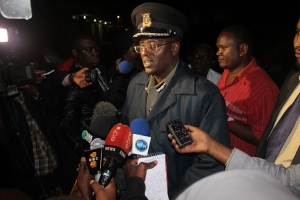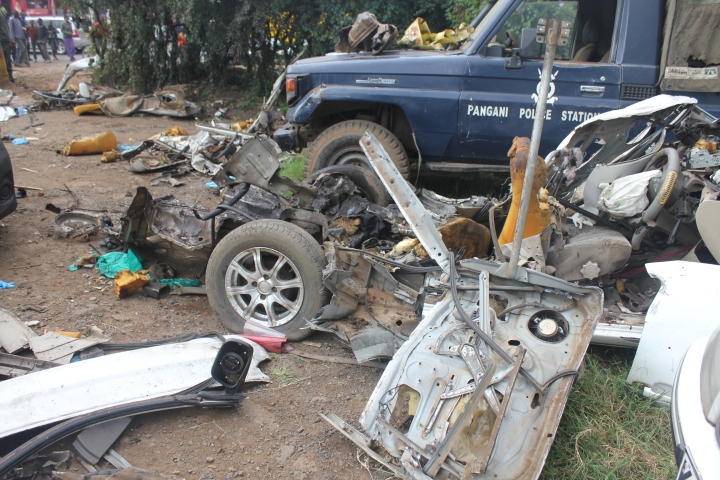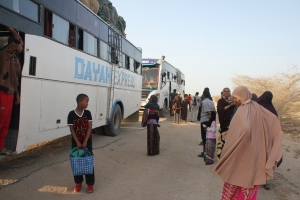The stand of the Kenya government is not clear: are they fighting terrorism, refugees inside the country, or an ethnicity?
Kenya has been faced with continued explosions in recent months that led to the Counter-terrorism operation or the “Usalama Watch” that was launched to secure the country since the Kenya Defense Force moved into Somalia in 2011.
The operation started on 1 April 2014 after the twin blast in Eastleigh that killed six and injured 31, when the government stepped up measures to fight terrorism in all the major cities. The first phase of the operation targeted the residents of Eastleigh North who are predominantly Somali, among other forced migrants.

More than 500 suspects of Somali origin were arrested in the daytime swoop after the twin blast at 12th Street in Eastleigh. Somali urban refugees are the main target for this continued offensive as the government carries out the swoops. “This national security operation will continue until every Kenyan is safe and we are not relenting,” Mr. David Kimaiyo, Inspector General of Police, said in a press briefing.
The operation whose objective was to bring the terror suspects to book was believed to have been conducted in harsh and brutal ways according to the Muslim community. According to the residents of Eastleigh and prominent Somali political leaders, the operation was launched specifically to attack the Somali ethnicity. This had strong negative impacts on religious divisions. Both refugees and illegal immigrants have accused the police involved in the swoop of harassment, taking huge bribes and stealing people’s properties, a claim which was denied by the police bosses.
Other suburbs of Nairobi occupied by people of Somali origin have also experienced military and para-military crackdown, regardless of their nationality.

For the last three months security forces have been on the hunt to curb the menace of terrorism within the Kenyan borders. However, despite the fact that the country’s security remains tight, repeated car explosions have occurred in the Nairobi area and the coastal town of Mombasa.

On April 23rd, a car bomb explosion at Pangani police station killed four, two of them police officers, while on 4 May, twin explosions in two buses on Thika road in Nairobi killed three and injured at least 86.
Extortion and sexual harassment
Eastleigh has learnt to accept the continued day and night shakedown that has become a common occurrence in the district. Since the beginning of April, it is accustomed to start around midnight and continue through the morning. The Kenya police are visiting every home and quarters demanding identification checks. “These actions are too brutal but we have learnt to accept it and life goes on,” Imran Hussein, a business woman, disclosed. “The nights were human ATMs while the day remains the malls hunting, therefore we opt to close our shops when we see the police,” she added.
Refugees who are victimized by this crackdown continued to share their negative experiences and suffering that includes bribes, assaults and sexual harassment by the police. On the morning of 31 May, Ambia Haji a Somali refugee, told of her encounter with the police officers after their homes were searched during that night. “We were in fear every night and like many other nights we slept late with one eye on the door. No sooner the loud bang on the entrance gate scared everyone, children were woken up, cries and screams filled the dark as the doors were loudly beaten with metal rods for those who delayed to open rooms for the police.”
As she continued the interview a slender, brown colored 18 year old lady whose eyes were filled with tears could not help whimpering. “We’re all trembling in fright but as my sister headed to answer the door angry policemen forced themselves into the house and slapped her on the face. She fell down as they explored every corner of our rooms turning mattresses and cushions upside down. We all had the Refugee Alien Identifications at hand but they ignored the documents and arrested everyone in the vicinity,” she narrated.
According to Ambia her siblings were arrested that night together with their neighbors but she was able to bargain to be left behind. She could not speak further and dodged from the topic, but stated that her siblings spent three days at the police station until they raised some money to free them. However, it was learnt that hundreds of refugees have similar cases with the police in counter-terrorism operations.
Deportation and relocation
The first deportation of Somali refugees started on 9 April when 87 were sent to Mogadishu. As the country tightened its security operations the explosions continued in Nairobi, which seem to trigger the government’s punitive decision. Thousands of the refugees were rounded up and taken to Safaricom Kasarani Stadium where they were screened and prepared for deportation.
By 23 May, at least 359 people of Somali origin had been deported to Mogadishu. According to the Kenyan Immigration Department, all the deportees to Somalia were illegal immigrants. For the last three months, the Safaricom Kasarani Stadium has become a new concentration center of its own kind.
As the sweep up continues numerous roadblocks are observed on Juja road, Bahati-junction to Jogo road and on the way to Eastleigh. However, the manner in which the police are handling security is irresponsible according to Human Right Watch and civil society actors in the country, but the United Nations High Commissioner for Refugees (UNHCR) who should supposedly advocate for the rights of refugees has stayed completely silent on the violation of refugee rights under its surveillance.
By the start of May, at least 5,500 people, most of them ethnic Somalis, had been targeted, of whom 1,636 people underwent screening at Safaricom Kasarani Stadium, close to 200 of whom were released according to an official source.
In March the Kenya Interior Ministry warned that all the refugees residing outside the designated refugee camps of Kakuma and Dadaab are directed to return to those camps with immediate effect. “Any refugee found flouting this directive will be dealt with in accordance with the law,” Joseph Ole Lenku said in a statement.
The move by the government to stand against the refugees or aliens within their territory shows that Kenya is violating its own laws regarding persons of concern, while the continued expulsion of the Somali refugees affects other refugees in the urban centers who remain at risk and in fear of persecution and deportations, despite possessing the government issued Alien Identification Cards which are currently rendered valueless.
By the end of June, approximately 2,500 had been sent to Kakuma and Dadaab refugee camps by the government, while about 4,500 had been forced by circumstances to travel to isolated camps by their own means. Human Rights Watch has condemned the deportations and forceful return of refugees to camps as a gross violation of refugees’ rights under the Kenyan Refugee Act of 2006.
Kenya is signatory to the 1951 Geneva Convention and the 1969 OAU Charter but the country continues to ignore the principle of non-refoulement of persons of concern to international protection. It’s not yet clear how the government means to fight the real culprits of terror attacks in the country.
As the refugees are vulnerable members of the community while in exile and deemed to be in need of international protection, the question remains how the government benefits by discriminating against refugees?

1 reply on “Kenya against the Refugees”
[…] von der Regierung in Nairobi, als auch den internationalen Hilfsorganisationen uneingeschränkt kontrolliert und überwacht […]